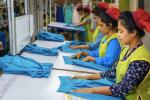This is also true of our local construction industry.
According to a report published by the Construction Industry Development Authority of Sri Lanka (CIDA), the sector annually contributes as much as 7% to the country’s Gross Domestic Production and is the fourth largest contributor in terms of employment.
Last March, at the beginning of the first lockdown, the government was forced to implement and enforce laws and health regulations to mitigate the spread of the virus in the country.
Unsurprisingly, this had a major impact on ongoing construction project pipelines and the workforce in the sector.
The entire industry had to adapt rapidly to navigate this previously unknown territory and rethink workers’ safety, supply chain processes, designs, integration of digital solutions, and more.
Further, challenges gradually compounded as stringent trade controls were imposed, posing value chain disruption risks due to Sri Lanka’s high reliance on imports for the construction sector.
In a sector outlook report, ICRA Lanka states that this particularly affected projects within the Western Province, encompassing a sizeable portion of the entire market, which came to an abrupt, forced stop.
A majority of the construction labourers migrated to their home towns during the lockdown period.
Even after their gradual return, when the lockdown was eased, there still remains a shortage of labour.
“The construction industry is controlled by three main factors, which are time, cost and quality.
The COVID-19 pandemic had a massive impact on time and cost due to implications following state-imposed health protocols and policy changes,” stated Young Constructors' Forum Former President Shanika Cabraal.
“However, most of these challenges were resiliently overcome due to innovation and agility on the part of developers and the committed workforce who were forced to adjust sails quickly and charge ahead.
In terms of skilled labour, we also noticed an uptick in workers switching to careers in construction which was a promising turn of events,” she added.
To overcome the numerous roadblocks, the industry accelerated the adoption of technology and stringent health protocols to ensure the safety of job sites and workers.
A transition to remote working was made to support social distancing and maintain business continuity.
Digital approvals were permitted to minimize interaction, and IT support was provided remotely.
Further, SMS gateways were implemented to share official information from the Management/HR departments, while tools such as video conferencing were enabled for meetings and training sessions.
“All of us vested in the construction industry aim to drive transformational change and continue to deliver significant economic impact by integrating strong and well-thought-out innovation to streamline our processes and accelerate development.
In fact, even within the YCF, the pandemic has ignited more open conversations on how we can make the industry more attuned to technology and even other critical needs such as sustainability, diversity and inclusivity.
Members in our forum have even lead discussions with key stake holders of the newly formed government to ascertain both short and long term plans to revive the industry.
As a powerful coalition of young blood in the industry, we are confident of our ability to create value, empower communities, and help mitigate global challenges in construction,” President of the Young Constructors' Forum, Anisha Dharmadasa opined.
He continued to elaborate that the industry will benefit greatly by integrating and scaling up tried and tested digital, enabling and manufacturing technologies that already exist whilst innovating where there are gaps in knowledge to create a sustainable construction ecosystem fit for the next normal.
This will improve efficiencies and quality across the industry while enabling us to find new products, processes and materials necessary to maintain and promote our country’s sustainability goals.
The Young Constructors’ Forum (YCF) is a group of young professionals representing the leading construction firms in Sri Lanka.
The Forum’s mission is to come together to voice and discuss the concerns and promote innovation within the next generation of engineers and constructors.
One of the YCF’s most valuable assets is its connected ecosystem of collaborators focused on driving positive change that would otherwise be impossible in silos.
By linking together minds in diverse businesses, its dynamic industry-led team supports a culture of innovation that drives transformational change across the construction industry.
Businesscafe Image - Left to Right President of the Young Constructors' Forum Anisha Dharmadasa and Former President of the Young Constructors' Forum Shanika Cabraal.























